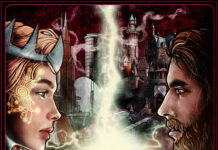Us beautiful, fantastical, celestial space-cakes in the music-loving world don’t get a lot of opportunities to just zone out to the greatest of soundscapes without delving deeply into the psychedelic scene. So for those of us who like those ambience of OZRIC TENTACLES with the psychedelia of INFECTED MUSHROOM, blended with the beautiful, atmospheric soundscapes of movie and video game scores, you will surely find something to love about AURI. That’s right, we get the incredible musical versatility of Troy Donockley added to the magic and drama of Tuomas Holopainen, topped off by the ethereal beauty of Finland’s own fairy-like vocalist, Johanna Kurkela, leaving us with nothing less than another little slice of musical magic. “II: Those We Don’t Speak Of” will be released on September 3rd, 2021, via Nuclear Blast Records. Check our our interview with Tuomas Holopainen and Johanna Kurkela here.

There’s a darkness to the title track, which also doubles as the album’s opener. The almost dissonant piano smashes and vaguely ominous feeling is ever-present, but it’s hard to feel as though you should turn back, but rather, that they are inviting you into just the right kind of musical world for those who dare to continue. The opener is seemingly inspired by the psychological thriller “The Village” and is easily as good at building up tension and luring you into the music. They then ease you into their world gently with the sweetness of “The Valley,” the first single. There is something incredibly heartwarming about this song and it possibly contains the catchiest chorus out of all tracks. Next, AURI dive into an almost classic Disney score sound with “The Duty of Dust,” which has softly soaring strings and harmonized vocals, sometimes with Johanna in the lead with her mystical sound, while other times Troy adds a deeper tone. They also don’t shy away from letting Kai Hahto add a pinch of that tribal sound that we hear much more strongly in NIGHTWISH‘s “Human.:||:Nature.” There’s something about the title of this track, exactly describing what this song sounds like, the vocals sound like dust in the wind (not the song, the feeling), which makes it all the more magical.
“Pearl Diving” was the second single and one that I confess took me a few listens to fully get on board with. However, the strummed acoustic guitar and sounds of a fishing boat on the sea, combined with Johanna‘s sweet vocals, building up so swiftly and almost unexpectedly… the song might just sweep you off your feet if you’re not careful. If the first half doesn’t convince you, about halfway through, it takes a surprising turn into a folky extravaganza, before softening back out by coming full circle and slowing down. This is one of those songs that you can easily enjoy literally as a song about pearl diving, or you could surely find your own personal metaphors to add to it. Way to sneak a guitar solo in there too!
In our interview, Tuomas mentioned that AURI‘s sound has no restrictions, it’s just whatever they want it to be. This is pretty obvious, because it sounds like so many things. For a soaring, mountainous landscape soundscape, almost hymnal in its respectful feel, look no further than “Kiss the Mountain.” For something more like a classical score – and in my opinion, perhaps an improvement on the movie score for the 2005 film depiction of Pride and Prejudice – “Light and Flood” hits just the right spot (if you’ve ever played Journey or enjoyed its soundtrack by Austin Wintory, you’ll know the feeling), and this is before it changes mood into something that feels like an ivy-covered cottage in the spring (the music from Hayao Miyazaki’s The Secret World of Arietty has a similar feel). Then, if you’re more in the mood for high violins and lamenting pianos in a soft, mournful, yet sweet manner, “Scattered to the Four Winds” is for you.
They tease some new folk instruments in “It Takes Me Places,” which features one of the liveliest and most delightful dynamic punches, as well as some really creative vocal melodies. The song feels centered to slightly minimal verses of Kurkela‘s vocals and piano, but sometimes other instruments are added to create that extra depth into the sound. Again, the song starts off softly, but then midway through, a folky C-part is introduced, before it slows then and starts again from the top.
“The Long Walk” has the feeling of a lament or farewell, with a lot of backing ambience, including a tribal feel due to the drums and an added dimension with bells. As the song progresses, the piano is added for a softer touch; while subtle, it certainly adds to the dynamics of this song. There’s a beautifully melancholic piano-driven part, to which string instruments start taking over the melody, cleverly adding suspension to this track as it builds up towards a climax. This is highlighted by the fact that the drums have started taking over a “walking” pattern, so it’s starting to feel like you are actually walking down a long and winding road.
The aforementioned “Scattered to Four Winds” feels like the ending of a journey, where everything winds down and you’re left with a feeling of tranquil serenity. It’s no surprise that this track is placed towards the ending of the album, as some of the prior tracks have been pretty intense. On this album, some of the atmosphere is created by sounds that fit the themes of the song; for instance, in the previous track you could hear footsteps and in “Scattered to Four Winds,” at times, you can hear the wind softly blowing.
Admittedly, while I did think NIGHTWISH‘s tavern at the end of the world livestream was lovely in its own way, I get more of an ambient, peaceful, middle-of-nowhere fireside tavern feel from this album’s closer, “Fireside Bard.” There’s something sweet and final about it, almost as if the whole album was a story being told by a traveling troubadour at a crossroads campfire under a starry sky, or some comfortable small tavern, surrounded by other travelers, perhaps enhanced by the sound of a crackling fire at the end of the song.
While fans who fell in love with the sound of AURI‘s strong debut effort will surely love this sophomore album, it does present slight differences from the former. As a perfect soundtrack to the world we are living in, somehow “II: Those We Don’t Speak Of” sounds a bit darker but no less delightful. Some of the songs are still heartwarming, may it be that they are more atmospheric and ambient than before. In this record, AURI plays around with the concept of dynamics, sometimes lulling its way into life’s general ambience, while at other times, it demands attention. This is not an album that will easily open itself up to listeners, unless you’re the type who gets so into a movie score that you forget to pay attention to the movie for a while. This is exactly the type of music that shows that inspiration breeds inspiration. Clearly, the music was written with great feeling and emotion, perhaps inspired willingly or not by someone else’s art, and will surely go on to inspire further art in the future. It’s nice to know there are still artists out there who seem to want to do nothing more than add a little more beauty into the world. That’s what AURI have done with “II: Those We Don’t Speak Of.”
Tracklist
- Those We Don’t Speak Of
- The Valley
- The Duty of Dust
- Pearl Diving
- Kiss the Mountain
- Light and Flood
- It Takes Me Places
- The Long Walk
- Scattered to the Four Winds
- Fireside Bard
Lineup
Johanna Kurkela
Tuomas Holopainen
Troy Donockley
Label
Nuclear Blast Records





